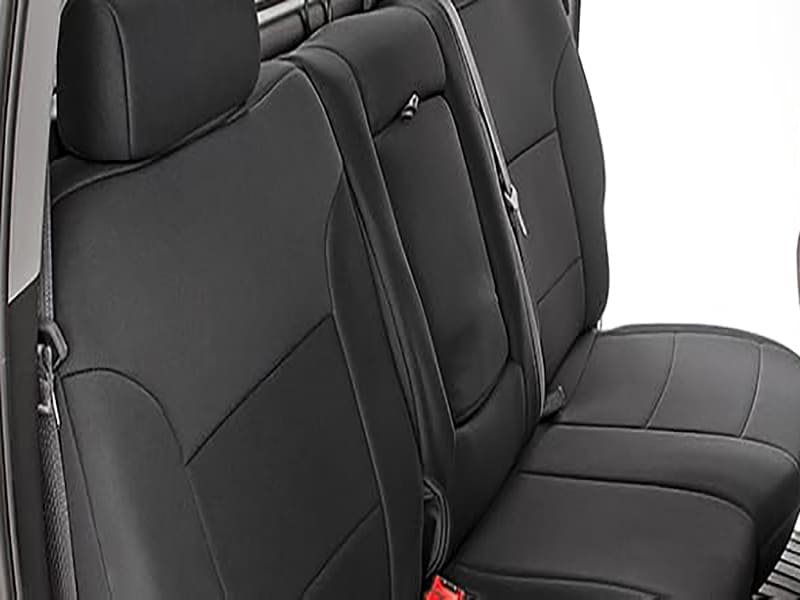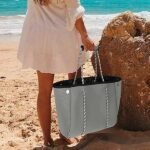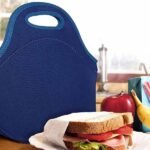Choosing the right material for your car’s seat covers is crucial. It’s not just about aesthetics; functionality, durability, and comfort are all important factors. Neoprene and Cordura are two of the most popular materials for seat covers. But which one is the better choice? This guide will help you understand their differences and choose the right one for your needs.
Neoprene seat covers and Cordura seat covers cater to different needs. Neoprene offers water resistance and comfort, while Cordura excels in durability and ruggedness. Let’s explore their features and uses in detail.
What Are Neoprene and Cordura Seat Covers?
Neoprene and Cordura are two materials known for their unique properties. They are widely used in automotive seat covers for different reasons, including durability, water resistance, and appearance.
Neoprene seat covers are made from synthetic rubber, offering flexibility, water resistance, and a smooth texture. Cordura seat covers are crafted from heavy-duty nylon, known for its ruggedness and abrasion resistance. Both materials are suitable for specific applications depending on your lifestyle.
Key Features of Each Material
| Feature | Neoprene | Cordura |
|---|---|---|
| Texture | Smooth and soft | Coarse and rugged |
| Water Resistance | Excellent | Moderate |
| Durability | Good | Exceptional |
| Comfort | High | Moderate |
Understanding these materials’ characteristics can help you decide which one suits your vehicle best.
What material is best for seat covers?
The best material for seat covers depends on your priorities. Whether it’s water resistance, durability, or comfort, each material has its strengths.
Neoprene is ideal for water resistance and comfort, while Cordura is better suited for heavy-duty applications requiring toughness. Consider your specific needs to make the right choice.
Factors to Consider
- Usage Environment: For outdoor adventures or water-prone activities, neoprene is an excellent choice. For rugged and demanding conditions, Cordura works better.
- Maintenance Needs: Neoprene is easier to clean, while Cordura requires more effort due to its texture.
- Aesthetic Preferences: Neoprene offers a sleek, modern look, while Cordura gives a utilitarian appearance.
Choosing the right material ensures that your seat covers meet your expectations in both functionality and style.
What Are the Key Differences Between Neoprene and Cordura Seat Covers?
Neoprene and Cordura differ in several aspects, from texture and water resistance to durability and weight.
The main differences between neoprene and Cordura seat covers lie in their water resistance, durability, and comfort levels. Each material is suited for different types of users and environments.
Detailed Comparison
| Property | Neoprene | Cordura |
|---|---|---|
| Water Resistance | Waterproof | Water-resistant |
| Comfort | Soft and flexible | Stiffer, less comfortable |
| Durability | Good for daily use | Superior for rough conditions |
| Weight | Lightweight | Heavier |
| Customization | Highly customizable | Limited customization |
These differences highlight why one material might be preferable over the other based on specific needs.
Are Neoprene Seat Covers More Comfortable Than Cordura?
Comfort is often a deciding factor when choosing seat covers, especially for long drives or daily commutes.
Neoprene seat covers are more comfortable than Cordura due to their softness, flexibility, and cushioning. The material provides a smooth texture that enhances the driving experience.
Comfort Features of Neoprene
- Soft Texture: Feels pleasant against the skin, especially during long drives.
- Flexibility: Adapts to the shape of the seat for a snug fit.
- Thermal Insulation: Remains comfortable in both hot and cold weather.
Cordura, while durable, lacks the softness and adaptability of neoprene, making it less comfortable for extended use.
How Durable Are Neoprene and Cordura Seat Covers?
Durability is crucial, particularly for vehicles exposed to harsh conditions or heavy usage. Both neoprene and Cordura are durable, but their performance varies based on specific challenges.
Cordura seat covers are more durable than neoprene, offering exceptional resistance to tears, abrasions, and heavy wear. Neoprene is durable but is more susceptible to sharp objects and extreme conditions.
Durability Insights
| Factor | Neoprene | Cordura |
|---|---|---|
| Tear Resistance | Moderate | High |
| Abrasion Resistance | Good | Exceptional |
| UV Resistance | Good | Very good |
For off-road vehicles or those subjected to rugged use, Cordura is the better choice. Neoprene, however, provides sufficient durability for most everyday applications.
Which Seat Cover Material Is Easier to Clean and Maintain?
Keeping seat covers clean is essential for hygiene and appearance. The ease of cleaning depends on the material’s texture and resistance to stains.
Neoprene seat covers are easier to clean and maintain due to their smooth surface and waterproof nature. Cordura, with its coarse texture, requires more effort to remove dirt and stains.
Cleaning Comparison
| Cleaning Method | Neoprene | Cordura |
|---|---|---|
| Spot Cleaning | Easy | Moderate |
| Stain Removal | Quick | Takes longer |
| Maintenance Effort | Low | Moderate to high |
Neoprene’s low-maintenance properties make it an excellent choice for families, pet owners, and those with active lifestyles.
Conclusion
Choosing between neoprene and Cordura seat covers depends on your specific needs. Neoprene excels in comfort, water resistance, and ease of maintenance, making it ideal for daily drivers and families. Cordura, on the other hand, is unbeatable in durability and ruggedness, perfect for heavy-duty applications.
At Szoneier, we specialize in high-quality neoprene seat covers tailored to meet the needs of brands, wholesalers, and retailers. With years of experience and a commitment to excellence, we provide customizable solutions that combine functionality and style.











